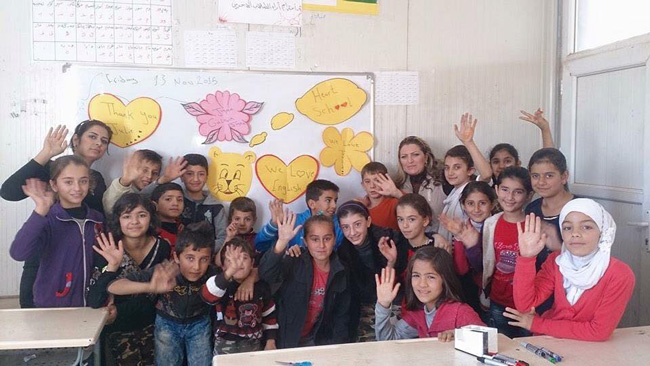
By James Martin
Classrooms breed collaboration. Students meet, they bond over ideas and shared interests, and often something new and exciting is born: a friendship, a business, a project.
And they don’t even need to be in the same room as each other. Or even the same country.
At least, that was the experience of three students enrolled in an online course offered by the Desautels Faculty of Management last fall. Although they live in three different countries, they worked together to create the first-ever classroom for Syrian children living in an Iraqi refugee camp.
Kaniwar Kh Ali, Sofia Benslimane and Julie Pratten-Kacmaz were among the 5,000 students enrolled in “Social Learning for Social Impact,” a group-based take on non-credit massive open online courses, or MOOCs. This GROOC, as it was known, was a world first—and brought together students from more than 100 countries.
Ali is a Syrian living in a refugee camp near Dolhuk, Iraq. Benslimane lives in Morocco, and is a Desautels graduate who double-majored in Operations Management and Strategic Management. Pratten-Kacmaz is a British teacher who has taught English in more than 20 countries, including Brazil, Germany, Lithuania and Paraguay; she joined the GROOC from her current home in Antalya, Turkey.
The GROOC instructors asked that students put their course learning into practice by collaborating on a real-life social initiative to create positive change—something akin to the Grameen micro-financing bank or a humanitarian NGO like Médecins sans frontières, but on a scale modest enough to be designed and implemented over the course of a semester.
“It’s about being passionate about something,” says Leslie Breitner, a faculty lecturer in the Desautels Faculty of Management. She created the GROOC with Professor Henry Mintzberg, PhD candidate Carlos Rueda and Anita Nowak, director of operations of McGill’s Social Learning for Social Impact MOOC. “Some students were developing a project that they’d already started before the GROOC, and some were joining something for the first time.” Students met in person if possible, but most worked together using social media tools. The approximately 200 projects ranged from helping unemployed people get back into the workforce, to promoting the power of dance in general health, to micro-finance, nutrition and steering at-risk teens away from lives of crime. “It really was the whole spectrum,” says Breitner.
Ali pitched the idea of doing something to help the children living in his refugee camp. “As a member of the enhanced language teaching profession,” says Pratten-Kacmaz, “I thought an initiative should be started to harness help from the international ELT community.” Collaborating through Skype and Facebook, the three GROOC students launched a crowdfunding campaign to finance “Heart ELT,” a mobile classroom serving the children in Ali’s camp. The classroom opened in October 2015. Today, a volunteer teaches English to Syrian children. “These kids have been through a lot and need a space where they can meet, learn and have fun,” says Pratten-Kacmaz.
The Heart ELT team wants to next equip that Dolhuk classroom with computers and Web access. They’re also hoping to expand. Pratten-Kacmaz notes that there are thousands of Syrian children living in similar refugee camps near the Turkey and Iraq borders. She and her colleagues are now crowdfunding for phase two, which will expand the project into other refugee camps.

Thank you for giving coverage to Heart ELT. As the facilitator of GROOC, it was a privilege and honour to be able to invite Kaniwar Kh Ali and Julie Pratten to join the GROOC and help them create the group.